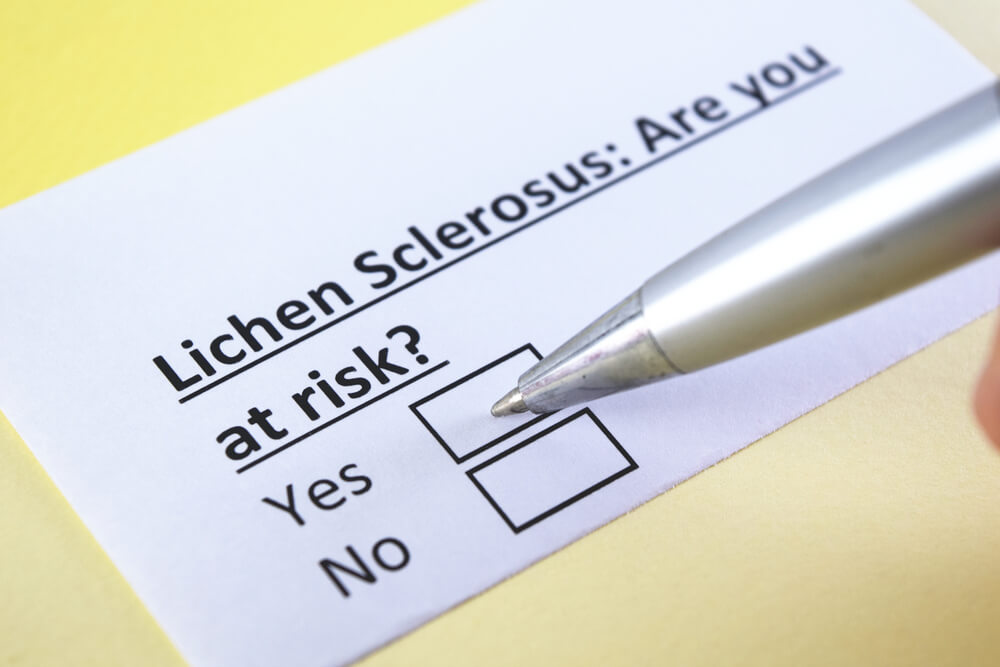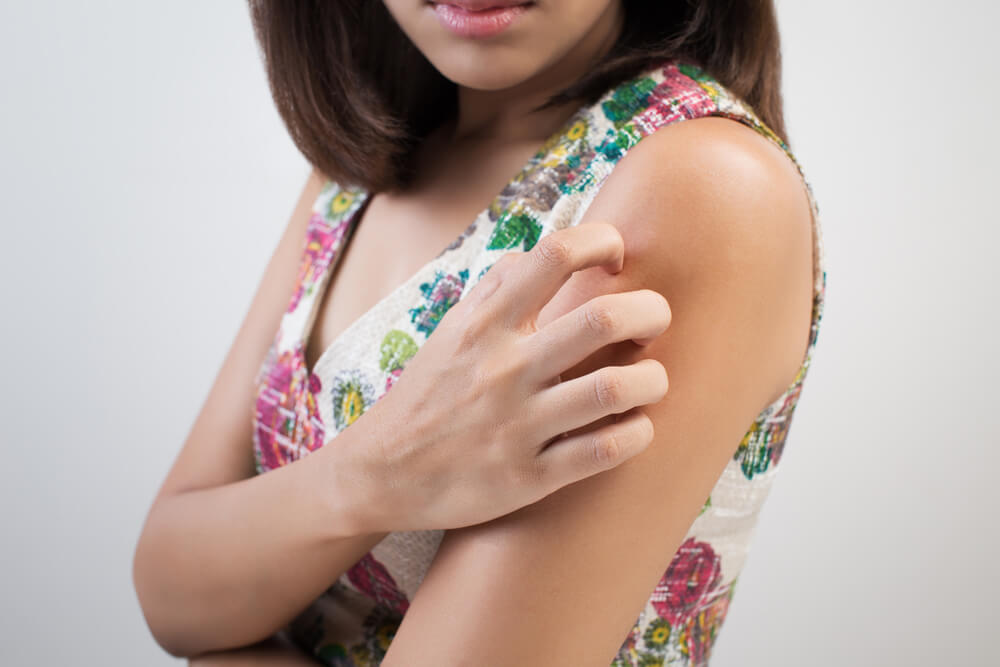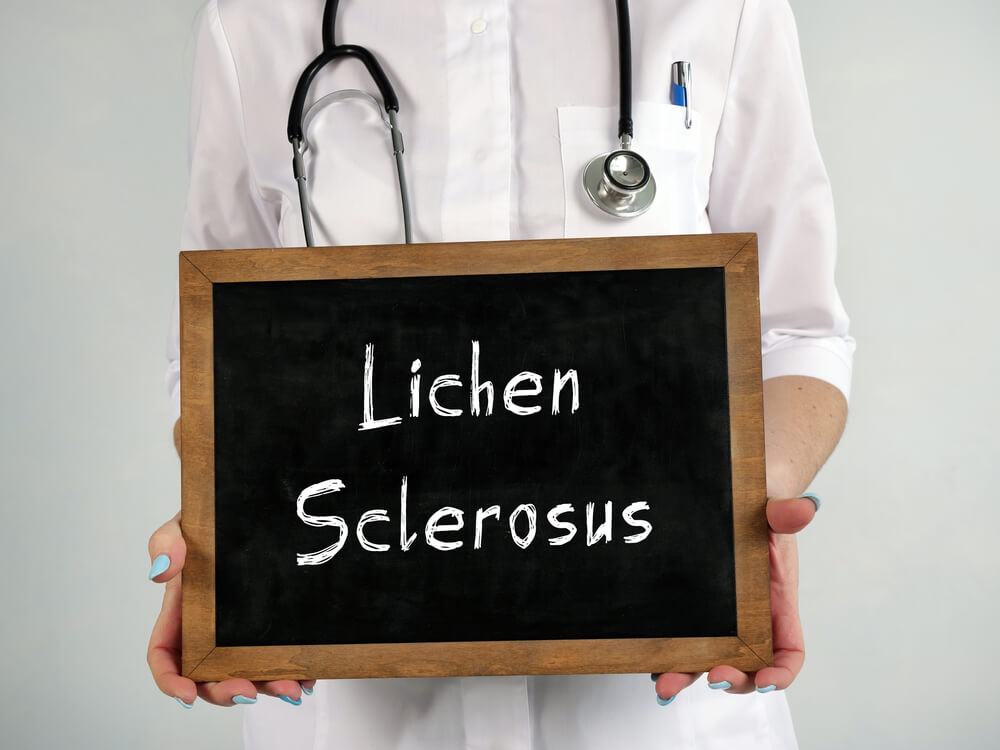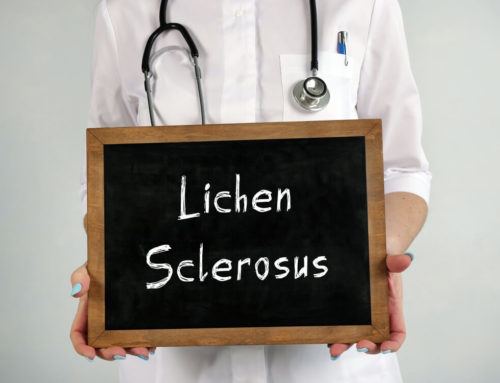Lichen sclerosus is a chronic and uncommon skin condition that creates thin, patchy, and white-spotted on your skin. It can occur in anyone at any age. However, this condition is most common in postmenopausal women over the age of 50.
Lichen sclerosis is among the common vulvar skin conditions in which the genital areas are affected. But the condition can uncommonly affect other parts of the body, like the thighs, mouth, breast, and shoulders.
Causes of Lichen Sclerosus

Your skin has multiple layers. The layer that’s exposed to the outside world is called the epidermis. Under this layer is a thicker layer called the dermis. This thicker skin tissue contains nerve endings, hair roots, blood vessels, and sweat glands.
When lichen sclerosis happens, the epidermis may become too thin, causing inflammatory cells to invade the dermis. This disruption of your dermis can cause broken blood vessels and swelling, and the stretchy collagen fibers in your skin might break. All of these disruptions can lead to pain, itching, and blisters on the surface of your skin.
While experts are still trying to understand what exactly causes this condition, it’s known that the skin condition runs in families. Because of this, doctors believe there is a genetic factor. This kind of sclerosus isn’t contagious. Some factors that may make you more likely to develop this condition include:
- Hormonal imbalances, especially involving estrogen
- History of skin damage
- Family history of lichen sclerosus
- History of sexual abuse
You might be at a greater risk of developing this condition if you have any of the following autoimmune diseases:
- Vitiligo
- Alopecia areata
- Thyroid disease related to an autoimmune disorder
- Anemia related to an autoimmune disorder
In men, circumcision appears to greatly lower the risk of the condition.
Symptoms of Lichen Sclerosus
While early-stage lichen sclerosus may not show any signs, as the condition progresses, you are likely to experience some or all of the following symptoms:
- Small white spots on the skin
- Vulvar itching
- Anal itching, pain, or bleeding
- Blisters
- Pain during sex
- Bruising and tearing of your skin
- Bleeding easily from minor skin rubbing
- Painful erections in men
- Pain or trouble when urinating
- Pain or bleeding during bowel movements
Fortunately, this condition only affects the skin on the outside of your body and doesn’t affect the inner reproductive organs such as the uterus or vagina.
Diagnosis of Lichen Sclerosus
The diagnosis of this skin condition is typically simple and can usually be carried out in your healthcare provider’s regular office in one visit. Your doctor will ask you about your symptoms and health history before performing a physical exam.
Usually, a physical exam provides enough information for your doctor to give a diagnosis. However, in some cases, such as early-stage lichen sclerosus where visual signs might be minimal, your doctor may want to do a skin biopsy. This is a simple procedure where your doctor will take a small skin sample from the affected areas before sending it out to be analyzed in a lab.
If your symptoms are similar to other conditions, different tests might be necessary to rule out other health problems like infection, low estrogen, vitiligo, autoimmune diseases, or lichen planus before your doctor decides to go forward with lichen sclerosus treatment.
Lichen Sclerosus Treatment
Early-stage lichen sclerosus or mild cases of the condition may not require treatment. However, this condition rarely gets better without treatment, so if you are experiencing uncomfortable symptoms or if you have the condition around your genitals or anus, lichen sclerosus treatment may be recommended by your doctor.
Treatment is usually targeted toward reducing itching, decreasing scarring, and improving the appearance of your skin.
Your doctor might recommend the following treatments:
- Corticosteroid ointment. These creams are usually the first step in treatment and help to alleviate itching. You will start by applying the ointment on the affected areas twice a day for several weeks before your doctor will decrease your prescription to twice a week for the prevention of recurrence.
- Steroid injections. If ointments don’t work, injections may be used to relieve itching.
- Low doses of tricyclic antidepressants. This treatment targets vulvar pain.
- Other medications such as tacrolimus or acitretin, which treat other skin disorders and may be effective against lichen sclerosis when other medications fail. Women of childbearing age should not be prescribed acitretin since it can cause severe birth effects.
- Ultraviolet treatment may be used if all other treatments don’t work to relieve your symptoms.
Your healthcare provider will monitor you for any side effects that are associated with your treatment, such as further thinning of the skin due to steroid use. Recurrence is common with this condition, so you may be required to go through a new round of treatment each time it reappears.
Possible Complications of Lichen Sclerosus
This condition may cause the following complications:
- Painful sex
- Urinary retention
- Constipation
- Inability to retract the foreskin in men
This condition can also increase the risk of squamous cell carcinoma (a type of skin cancer) if it is on the genital area. Other parts of the body having this condition doesn’t appear to increase the risk of skin cancer.
Your doctor may want to examine your skin regularly to check for signs of cancer, and you may be required to get biopsies of the affected areas. You will want to be proactive in checking for signs of cancer at home. Be on the lookout for lumps or sores that don’t heal.
If your sclerosus goes untreated, it may cause permanent changes to the appearance of your genitals, and the vaginal opening may narrow. The outer lips of the vulva may stick together and these changes may require surgery to correct.
Coping with Lichen Sclerosus

To reduce some of the symptoms of this condition, you will want to practice good hygiene. Additionally, your doctor might advise you to do the following:
- Resist the urge to scratch the area.
- Wear cotton underwear and avoid wearing pantyhose.
- Wear loose-fitting pants or skirts and dresses.
- Use only unscented soaps and detergents.
- Don’t apply soap directly to your affected skin.
- Use your fingertips to wash the vulva instead of washcloths.
- Don’t douche or use feminine sprays.
- Pat the vulva dry after washing and avoid rubbing the skin.
Preparing For Your Appointment
Come to your appointment prepared to get the most of your time with your doctor. Follow these tips when preparing for your appointment:
- Write down your questions, and if you’re comfortable bringing someone with you to your appointment, they can help you remember the answers your doctor gives you.
- Write down everything you want to remember during your appointment, like your diagnosis, tests, medications, and treatments your doctor recommends.
- Ask about medication side effects and alternative treatments.
- Write down the date, time, and reasons for any follow-up appointments you schedule.
This skin condition can be uncomfortable and might become increasingly painful if left untreated, but the outlook is usually good if you address the issue early. Since recurrence is common, you will need to work closely with your doctor to monitor your symptoms and create an effective treatment plan.
Do you still have questions about lichen sclerosus? Here at Florida’s New Age Women’s Health, our lichen sclerosus specialists and healthcare providers are experienced, compassionate, and ready to discuss any questions or concerns you may have. Call us to schedule your next gynecology appointment today!



